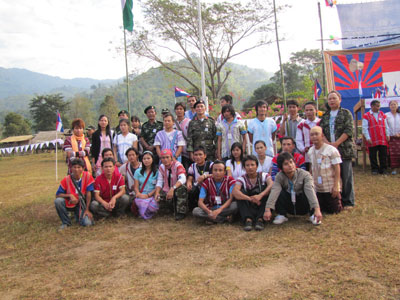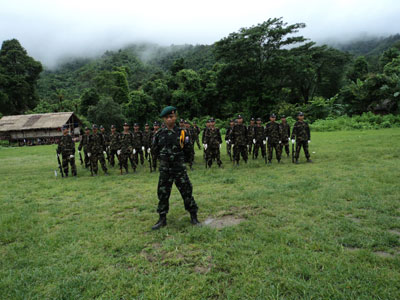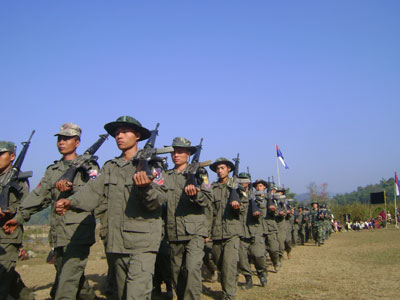“Victory is for the brave people who fight.” These words are very important to many Karen people, who have heard them from their leaders throughout their lives. The Karen say they are for them and for all people who fight for freedom...
“Victory is for the brave people who fight.” These words are very important to many Karen people, who have heard them from their leaders throughout their lives. The Karen say they are for them and for all people who fight for freedom.
 They are true words for seventy year old Padoh Saw Thamain Tun, Deputy in Charge of the Central Organizing and Information Department of the Karen National Union (KNU), who has been active in the Karen Revolution for over 40 years.
They are true words for seventy year old Padoh Saw Thamain Tun, Deputy in Charge of the Central Organizing and Information Department of the Karen National Union (KNU), who has been active in the Karen Revolution for over 40 years.
“To achieve our goal of freedom, all Karen people need to participate in the revolution with patriotism and knowledge of our political history,” he said in a recent telephone interview about the 62nd anniversary of the Karen Revolution Day, celebrated on January 31st in Karen State and many places around the world.
“Karen people want to have peace,” Saw Thamain Tun said.
“The Karen people have demanded their rights since the AFPFL (Anti-Fascist and People Freedom League) ruled the country (from 1947-1958).”
However, the AFPFL did not accept the demands of the Karen people and the Burmese Army raided KNU headquarters in Inn Sein Town on 31 January, 1949.
The Karen revolution began at that time.
Even though the KNU’s armed wing, the Karen National Liberation Army (KNLA), has been involved in the longest running armed struggle for freedom in the world, the KNU has attempted to negotiate a political solution to its problems with the Burmese military government.
 The KNU met with junta leaders six times over the last six decades, seeking a political solution. All the meetings failed to achieve that goal, however.
The KNU met with junta leaders six times over the last six decades, seeking a political solution. All the meetings failed to achieve that goal, however.
According to Saw Thamain Tun, who was part of the Karen delegation in the fourth meeting in 1996, the military junta has responded to the KNU’s attempts to negotiate peace with large scale military offensives.
“The main reason for the failure to reach a political solution over the years is very much based on their dishonest attitude. They didn’t accept our proposals, but only demanded we surrender,” he said.
“Now, our goal is to establish a genuine federal union in Burma, which will provide for equality and self-determination for all ethnic groups, as well as solidarity and peace,” he added.
Since the Burmese Army began its infamous “Four Cuts Policy” in Irrawaddy Division in 1965 and Karen State in 1975, which was designed to end the Karen insurgency, it has frequently shot Karen villagers on sight, burned hundreds of villages to the ground and destroyed farms and food supplies- forcing villagers to relocate, often hide in the jungle. Rape has been frequently used as a weapon by the Burmese troops.
Approximately two hundred thousand Karen have become Internally Displaced Peoples (IDPs) inside Burma. More than 130,000 Karen refugees have fled to Thailand, living in 7 camps inside the Thai border. Many more live as illegal migrant workers in Thailand, Malaysia and Singapore.
 The military junta has frequently accused the KNU of not wanting a peaceful resolution to the armed conflict, describing the Karen as insurgents in the state-run media.
The military junta has frequently accused the KNU of not wanting a peaceful resolution to the armed conflict, describing the Karen as insurgents in the state-run media.
However, the Burmese government has been widely criticized by members of the international community for its misuse of power and mistreatment of all Burmese people, especially ethnic minorities like the Karen.
That criticism has intensified since the government imposed its 2008 constitution on the country, using it to engineer what is widely described as an undemocratic and unfair election.
The Burmese military has increased troop strength in Karen State since the election, escalating armed conflicts. Fighting has increased in Phalu, Who Lay and Chu Kali, on the Thai border.
Despite the protracted war with the military government, Karen leaders believe that they will reach to their goal one day.
“It is not really important of how many years the Karen revolution lasts, but the important thing is that the Karen people stay united and fight because we must not be beaten, killed and raped by the military junta,” said a Karen soldier, who is currently fighting on the front in the Woh Lay area, near the Thai-Burma border.
He said Karen soldiers face grueling conditions during the battles with Burmese troops, but they will continue to fight for the freedom of their people.
Naw Htoo Phaw, from the Karen Women Organization said in an interview she wonders sometimes if the revolution can be successful after so many decades of struggle.
However, she also believes it will succeed if the Karen people remain united behind their cause, because, “the Karen revolution is a struggle for justice, existence and dignity.”
She said, “All Karen people have a responsibility to work for our national freedom.”
Karen leaders, like Padoh Saw Thamain Tun, believe all Karen people have to follow the words of KNU founder ,Saw Ba U Gyi, in his Four Principles: (1) Surrender is out of the question. (2) The recognition of the Karen State must be completed. (3) We shall retain our arms. (4) We shall decide our own political destiny.
He surely believed, “Victory is for the brave people who fight.”



